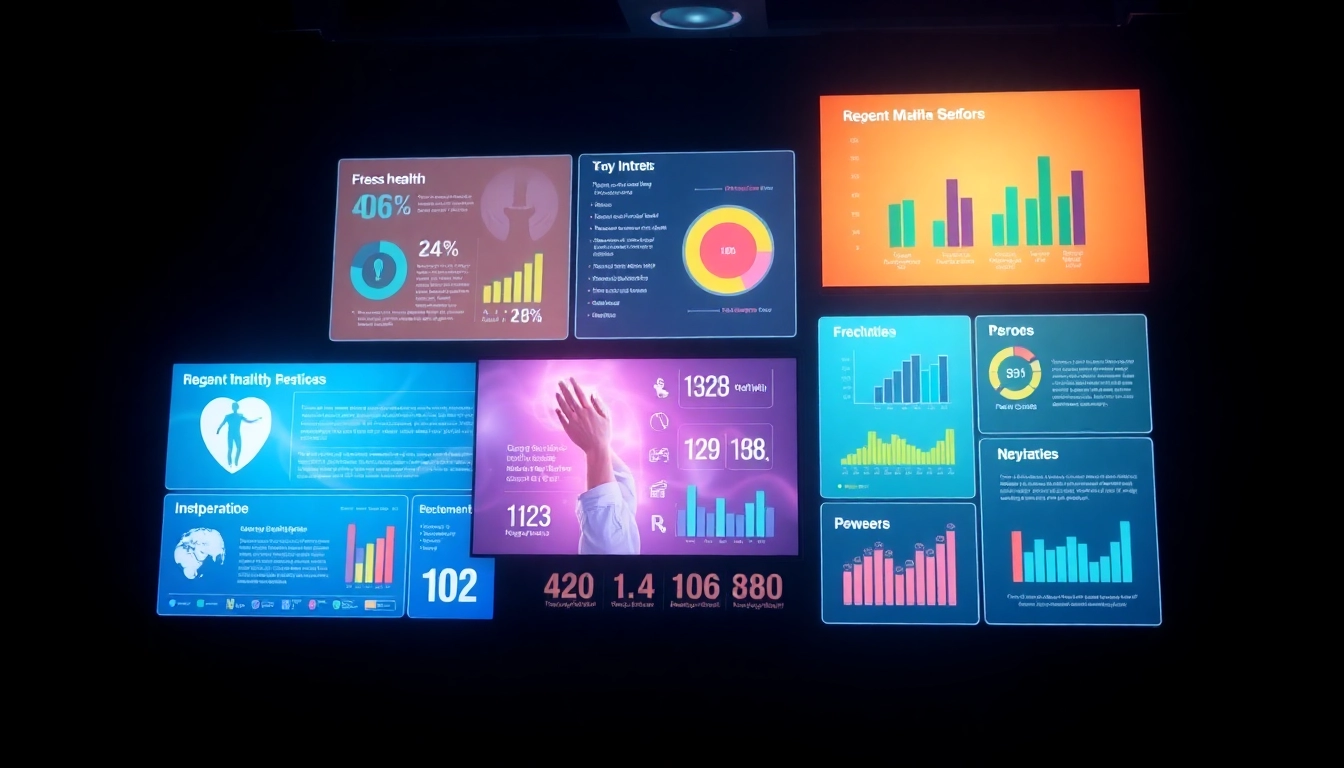Understanding Current Trends in Health News
The landscape of health news is constantly evolving, driven by groundbreaking medical discoveries, technological innovations, and shifting policy frameworks. Staying informed about these developments is essential for healthcare professionals, policymakers, and the general public alike. Recent updates highlight significant advances such as novel treatments, smarter health technologies, and global responses to pressing health challenges. For instance, the latest Health News explores not only these breakthroughs but also emphasizes the importance of integrating innovation with accessible healthcare policies.
Major Medical Breakthroughs and Discoveries
One of the most prominent trends in recent health news is the discovery of new treatment modalities for previously intractable diseases. Medical research continues to unlock cures and management strategies for illnesses like certain cancers and infectious diseases. For example, enhanced gene-editing techniques such as CRISPR have opened pathways toward personalized medicine. Furthermore, breakthroughs in immunotherapy have significantly improved outcomes in oncology, transforming prognosis for many patients. Recent studies also highlight the progress of mRNA vaccine technology in combating emerging infectious diseases, exemplified by COVID-19. These advances showcase medicine’s shift toward precision and tailor-made treatment, ultimately leading to higher success rates, fewer side effects, and improved quality of life.
Case studies, such as the rapid development and deployment of mRNA vaccines, demonstrate how scientific innovation can dramatically influence public health. Staying updated through trusted sources like Medical News Today allows medical professionals and consumers to remain informed about such vital progressions and their real-world implications.
Emerging Healthcare Technologies and Innovations
The integration of technology into healthcare delivery is accelerating at a remarkable pace. Digital health tools—such as mobile applications, wearable devices, and telemedicine platforms—are revolutionizing how patients monitor and manage their health. For example, sophisticated health apps now collect real-time data that can be used for early detection of health issues, promoting preventive care. Wearables like smartwatches measure vital parameters such as heart rate and oxygen saturation, empowering users with actionable insights.
On the innovation front, artificial intelligence (AI) is improving diagnostic accuracy and streamlining treatment plans. AI-driven image analysis, for instance, enhances clarity in medical imaging, enabling earlier detection of tumors or anomalies. Companies and research institutions are also developing AI algorithms to predict disease outbreaks and optimize resource allocation. These advancements democratize health access, especially in remote or underserved areas, by reducing healthcare disparities.
Global Health Challenges and Responses
Despite technological progress, global health challenges such as pandemics, antimicrobial resistance, and climate-related health impacts persist. The COVID-19 pandemic underscored vulnerabilities within health systems worldwide and prompted rapid policy adaptations. Governments have increased investments in vaccine development, surveillance infrastructure, and public health communication strategies.
Moreover, international cooperation has become more critical than ever. Initiatives like COVAX exemplify efforts to ensure equitable vaccine distribution, especially in low-income countries. Addressing antimicrobial resistance involves prudent antibiotic use and the development of new antibiotics, supported by global research collaborations. The overarching response to these issues emphasizes resilience, adaptability, and integrated health policies that leverage emerging technologies and scientific insights.
How Policies Influence Health News Outcomes
Healthcare policies serve as the backbone of health news narratives, shaping access, quality, and affordability of care. Recent policy changes are significantly influencing how health services are delivered and consumed. For instance, increased government funding for health research accelerates innovation, facilitating the development of groundbreaking treatments and preventive programs.
Latest Policy Changes Impacting Healthcare Access
Expanding healthcare coverage remains a key policy focus, with many nations implementing reforms to reduce barriers. Policies promoting universal health coverage—such as India’s recent infrastructural investments—aim to extend essential services to marginalized populations. Additionally, reforms in telemedicine regulations have enabled remote consultations during the pandemic era, greatly enhancing accessibility for those in rural or isolated regions.
Policy frameworks must also address cost containment, ensuring that innovations like advanced diagnostics and therapies remain affordable. Governments are exploring models such as value-based care to align incentives with health outcomes, fostering sustainable healthcare systems.
Government Initiatives and Funding for Health Research
Funding priorities directly influence the pace and direction of health research. Recent initiatives have focused on understanding and combating chronic diseases, mental health issues, and infectious outbreaks. For example, the Rs 7,616 crore infrastructure projects announced ahead of PM Modi’s Bihar visit reflect a strategic push toward building resilient health infrastructure that supports research and service delivery.
Public-private partnerships are becoming vital in accelerating innovation, especially in vaccine development and digital health. Transparent allocation and effective oversight of research funds ensure accountability and maximize health benefits.
Healthcare Regulation and Safety Updates
Regulatory frameworks play a crucial role in ensuring safety and efficacy in medical treatments and devices. Recent updates include stricter standards for approving new pharmaceuticals and medical devices, aimed at minimizing adverse effects and fraud. For instance, fast-tracking approval pathways for innovative therapies during health crises can be lifesaving, but require vigilant oversight.
Enhancing safety protocols, standardizing clinical practices, and enforcing quality assurance are ongoing policy objectives to build public trust and ensure consistent healthcare delivery.
Nutrition, Lifestyle, and Preventive Care Insights
In the realm of health news, preventive care and lifestyle interventions garner increasing attention. Scientific consensus underscores the significance of balanced nutrition, regular exercise, and mental wellness in reducing disease risk. Current dietary trends include plant-based diets, intermittent fasting, and personalized nutrition based on genetic profiles.
Top Dietary Trends and Nutritional Advice
Authors and nutritionists highlight the benefits of whole foods, rich in fiber, antioxidants, and essential nutrients. Incorporating a variety of fruits, vegetables, lean proteins, and healthy fats supports overall health. Public health campaigns advocate reducing processed foods, trans fats, and sugar intake to combat obesity and metabolic syndromes.
Personalized nutrition, driven by genetic and microbiome analyses, is emerging as a cutting-edge approach to optimize individual health outcomes. Staying updated on credible nutritional guidance helps consumers make informed choices amidst a plethora of fads and misinformation.
Exercise and Mental Wellness Strategies
Regular physical activity not only benefits physical health but significantly enhances mental well-being. Practices such as yoga, meditation, and moderate cardio have documented effects in reducing stress and anxiety. Recent health news underscores the importance of integrating mindfulness and mental health support into routine care, especially post-pandemic.
Adopting comprehensive wellness strategies ensures resilience against stressors and promotes a balanced lifestyle. Experts recommend setting realistic goals, creating structured routines, and leveraging digital tools for motivation and tracking progress.
Preventive Screenings and Early Detection Tips
Screenings for common conditions like hypertension, diabetes, and certain cancers are vital in catching health issues early. Regular check-ups, blood tests, and imaging as recommended by clinicians improve treatment outcomes and reduce healthcare costs over the long term.
Public health campaigns and workplace wellness programs are instrumental in encouraging proactive health management, fostering a culture of prevention rather than reactive treatment.
Technological Advances and Digital Health Tools
The rapid proliferation of health-related apps and wearable devices exemplifies the digital health revolution. These tools enable individuals to monitor vital signs, track medication adherence, and manage chronic conditions effectively. Data collected from wearables can be integrated into electronic health records, providing clinicians with comprehensive patient information.
Apps and Wearables for Better Health Monitoring
The market is flooded with applications designed for blood pressure management, sleep tracking, and calorie counting. Wearables like fitness bands now feature advanced sensors capable of detecting arrhythmias and oxygen levels, facilitating early intervention.
The key to maximizing benefits lies in user engagement and data accuracy. Developers focus on intuitive interfaces and personalized feedback to promote adherence.
Artificial Intelligence in Diagnostics and Treatment
AI-driven diagnostic models improve accuracy for diseases such as cancer, neurological disorders, and cardiovascular conditions. Machine learning algorithms analyze vast datasets to identify patterns beyond human recognition, streamlining clinical decision-making.
In treatment, AI assists in devising personalized therapeutic plans, optimizing resource allocation, and predicting patient outcomes. Leading hospitals are now implementing AI to enhance treatment efficacy and operational efficiency.
Data Privacy and Cybersecurity in Health Tech
As health data becomes increasingly digitized, protecting patient privacy is paramount. Cybersecurity breaches pose risks of data theft and misuse, undermining public trust. Regulatory frameworks like HIPAA in the US and GDPR in Europe set standards for data protection, but ongoing vigilance is essential.
Health organizations must adopt robust encryption, access controls, and regular security audits. Educating users about privacy practices further safeguards sensitive information.
Expert Opinions and Future Directions in Health News
Leading medical experts emphasize a multi-disciplinary approach combining technological innovation, policy reform, and community engagement. Dr. Jane Smith, a renowned epidemiologist, predicts that predictive analytics and AI will soon enable preemptive interventions, significantly reducing disease burden.
Predictions for Upcoming Health Trends
Forecasts suggest an increased focus on personalized medicine, especially in genetic therapies and microbiome manipulation. The integration of virtual reality (VR) and augmented reality (AR) in medical training and therapy is expected to grow. Additionally, global efforts to address climate-related health issues will intensify, with sustainable practices becoming central to healthcare operations.
How to Stay Informed and Prepared
To stay ahead, individuals and professionals should regularly consult reputable sources such as scientific journals, official health agencies, and specialized health news platforms. Participating in webinars, workshops, and continuing education ensures familiarity with emerging trends and best practices. Embracing a proactive stance toward health—through lifestyle choices, ongoing education, and technological adoption—positions us better to navigate future health landscapes effectively.





